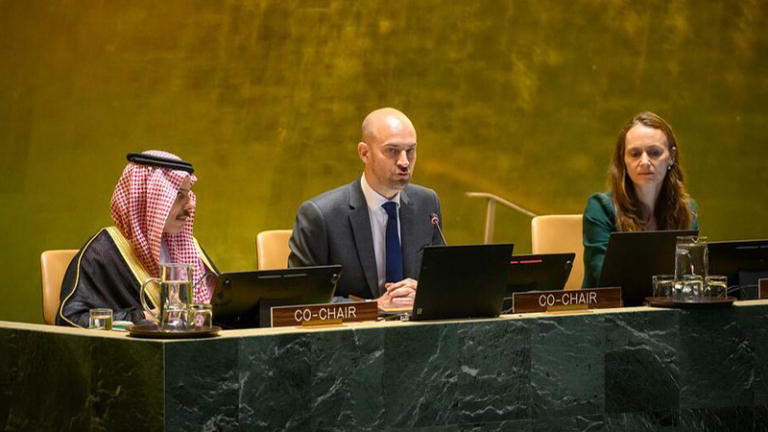
Recognition of a State of Palestine has recently taken on new momentum. On September 22, 2025, France became the latest country to extend recognition when French President Emmanuel Macron added his country’s voice to the growing chorus in the UN General Assembly (UNGA). France joined several other European countries, along with Australia and Canada, in recognizing Palestine the same month—a coordinated diplomatic move by US allies that broke ranks with Washington’s long-standing position and defied both Israel and the United States, the principal opponents of Palestinian recognition. These actions bring the total number of countries recognizing the State of Palestine to 157, roughly 81 percent of UN member states. Notably, 20 of these recognitions have come in the past two years, with half taking place in the last month.
The sudden wave of diplomatic recognitions for Palestine raises three questions: What purpose does it serve, why now, and what impact will it have?
What Will Recognition Accomplish?
The recent wave of recognitions was part of a strategy formulated by participants at the July 2025 UN High-Level International Conference for the Peaceful Settlement of the Question of Palestine (co-chaired by France and Saudi Arabia at the UN headquarters). The conference issued the so-called New York Declaration, which reaffirmed the necessity of a two-state solution, spelled out a pathway toward that goal, and outlined steps toward regional integration aimed at permanently ending the Arab-Israeli conflict. In September, the UNGA endorsed the New York Declaration after the three-day plenary that concluded the work of the conference.
In his speech to the General Assembly, Macron insisted that recognition of Palestinian statehood was an affirmation of “responsibility…and for peace”—not a rebuke of Israel. Macron said recognition of the State of Palestine would empower the Palestinian Authority (PA) and sideline Hamas—which France insists can have no governance role in any Palestinian entity. Macron added that the move would pave the way for the release of Israeli hostages still held in Gaza and open the way for the multi-phase peace plan outlined in the New York Declaration that would eventually result in a two-state solution. Six other European countries recognized Palestine around the same time—Luxembourg, Malta, Monaco, Portugal, San Marino, and the United Kingdom (with conditional recognition from Andorra and Belgium)—along with Canada and Australia; all offered similar justifications.
Why Now?
Deciding whether to recognize the State of Palestine inevitably involves considerations other than those of international law and diplomacy. European publics have been shocked by the rising Palestinian death toll since October 2023, now estimated at over 67,000—with potentially worse to come pending Israel’s push into Gaza City. Between 63 and 70 percent of the European public views Israel unfavorably, according to a May 2025 YouGov EuroTrack poll of six Western European countries. Although support for Hamas’s October 7 attack on Israel stood consistently in the single digits, only a small minority—between 6 and 16 percent—said Israel had acted appropriately in Gaza. Impotent to halt Israel’s assault on Gaza, European governments are in an uncomfortable position vis-à-vis their citizens.
European publics have been shocked by the rising Palestinian death toll.
Diplomatic hindsight may also have contributed to decisions to recognize Palestine. Had Europeans recognized a State of Palestine in 1994—when hopes for the peace process and a two-state solution were at their peak—a different path may have been possible. At the time, the Clinton administration fended off potential European interference in the implementation of the 1993 Oslo Accords by insisting that the United States was managing a delicate process that would deliver a final status settlement. Any premature recognition, it argued, risked derailing the negotiations. Three decades later, disillusioned by that failed promise and the Trump administration’s apparent disdain for multilateral diplomacy, European governments appear determined not to defer to Washington again.
A more cynical interpretation of the timing of this wave of recognition is that it is taking place now precisely because it is too late for a two-state solution. Viewed in this light, recognition is no more than a symbolic gesture with little political cost. The gesture serves to placate European citizens outraged by the climbing death toll in Gaza, while scoring points with Saudi Arabia and other regional partners with whom EU governments desire to deepen political, economic, and security ties. Any failure to change the status quo in Gaza can be blamed on Israel and the United States. Some analysts argue that the September rush to recognize Palestine is little more than diplomatic performance art.
Reactions of the Trump Administration: Surprisingly Quiet
One area where European moves could have an impact, of course, is on relations with the Trump administration. On September 22, 2025, President Donald Trump rejected unilateral recognition of Palestine in his speech to the UN General Assembly, claiming that “the rewards would be too great for Hamas’ terrorists for their atrocities.” Yet in a speech full of boasts, unfounded claims, and complaints about the UN and even the UN building facilities, this was a relatively minor point upon which Trump did not dwell.
Following President Trump’s lead, key US officials such as UN ambassador Mike Waltz and Secretary of State Marco Rubio also denigrated moves to recognize the State of Palestine. Yet Trump himself had previously appeared blasé when the topic came up. At a September 8 press conference with British Prime Minister Keir Starmer during Trump’s visit to the United Kingdom, the President described recognition of Palestine as “one of our few disagreements,” but left it at that. Trump reportedly offered little pushback in private against other allies contemplating recognition. In other situations where foreign leaders refused to toe the line, Trump might have threatened consequences such as higher tariffs. His relatively muted reaction to this issue has been striking.
Why the difference? One reason is that the Trump administration considers recognition of the State of Palestine to be an empty gesture, without force or effect on the ground. So far, such moves have served only to enrage Israel—which has promised its own unspecified consequences—and have not moved the needle toward actual Palestinian statehood. Indeed, in the short term, recognition may make things worse for the Palestinians if Israel responds by accelerating land grabs and settlement expansion in the occupied West Bank (not that it needs much encouragement) or undertakes other punitive measures. The Trump administration contributed to the spirit of retribution by denying visas to Palestinian Authority President Mahmoud Abbas and his delegation to travel to the UN in New York—though this was admittedly a relatively minor gesture as Abbas addressed the UN General Assembly by video link. The Trump administration may be content to allow Israel and outraged Republicans to take the lead on any further reprisals against countries that recognized Palestine.
The Trump administration considers recognition of the State of Palestine to be an empty gesture.
Trump’s subdued reaction may also indicate a belief that growing recognition of the State of Palestine helps his efforts to pressure Israeli Prime Minister Benjamin Netanyahu into ending the war in Gaza—a goal that Trump has pursued since before his second inauguration. Tension between the two leaders has been high: Trump has become exasperated with what he sees as Netanyahu’s efforts to avoid ending the conflict. So too has the American public: Israel’s support in the United States has slipped badly over the last two years. Polling for the Washington Post reported that 61 percent of American Jews now conclude that Israel is committing war crimes in Gaza—an astonishing figure. Trump may calculate that the wave of European support for the State of Palestine, along with plunging support for Israel among significant numbers of Americans, strengthens his hand in dealing with Netanyahu.
Gaza Peace Plan Casts a Shadow on Europe’s Gambit
Whether or not President Trump privately welcomed European recognitions of Palestine, throughout September and the UNGA meeting his administration worked hard behind the scenes to secure Arab support for its 20-point peace plan, which it knew would inevitably overshadow European actions and take center stage as the focus of international diplomacy on Gaza and Palestine. This is precisely what has happened. For a start, the plan retains a path toward a two-state solution, superseding the basic intent of European recognition. In the administration’s eyes, Trump’s new peace plan for Gaza simply trumps European diplomatic moves, which once again appear ineffectual relative to the American ability to dictate the agenda.
Recognition May Bring Some Benefits After All
There may still be some diplomatic, if not practical, benefits from recent recognitions of Palestinian statehood. The PA will now have the right to establish embassies in the countries where it is recognized, affording new opportunities for diplomatic engagement with senior levels of government, as well as platforms for engaging culturally and politically with European populations. This increased prominence may lend heft to Palestinian claims against Israel in international accountability bodies such as the International Criminal Court and help the PA expand Palestinian presence in international institutions. In addition, juridical recognition of Palestine as a legitimate state may increase pressure on European countries to review bilateral trade agreements with Israel—and may lead the EU to re-evaluate its overall trade relationship—to ensure these arrangements are not supporting illegal Israeli settlements in the West Bank, in accord with a 2024 advisory opinion of the International Court of Justice.
Most important, recognition of the State of Palestine adds to Israel’s diplomatic isolation and accelerates its eroding support among EU populations; it may embolden Israel’s opponents in the United States as well. Whether this will have meaningful impacts on such issues as US and European arms sales to Israel remains to be seen, but the trend is a troubling and potentially impactful one for Israel.
On balance, the wave of European recognition of the State of Palestine seems more symbolic than effective, a diplomatic response to essentially domestic political concerns, and a cry to remain relevant on a major global issue. With the focus now shifting to the Trump peace plan, however, Europe’s actual influence seems as questionable as ever.
The views expressed in this publication are the author’s own and do not necessarily reflect the position of Arab Center Washington DC, its staff, or its Board of Directors.
Featured image credit: Flickr/United Nations

